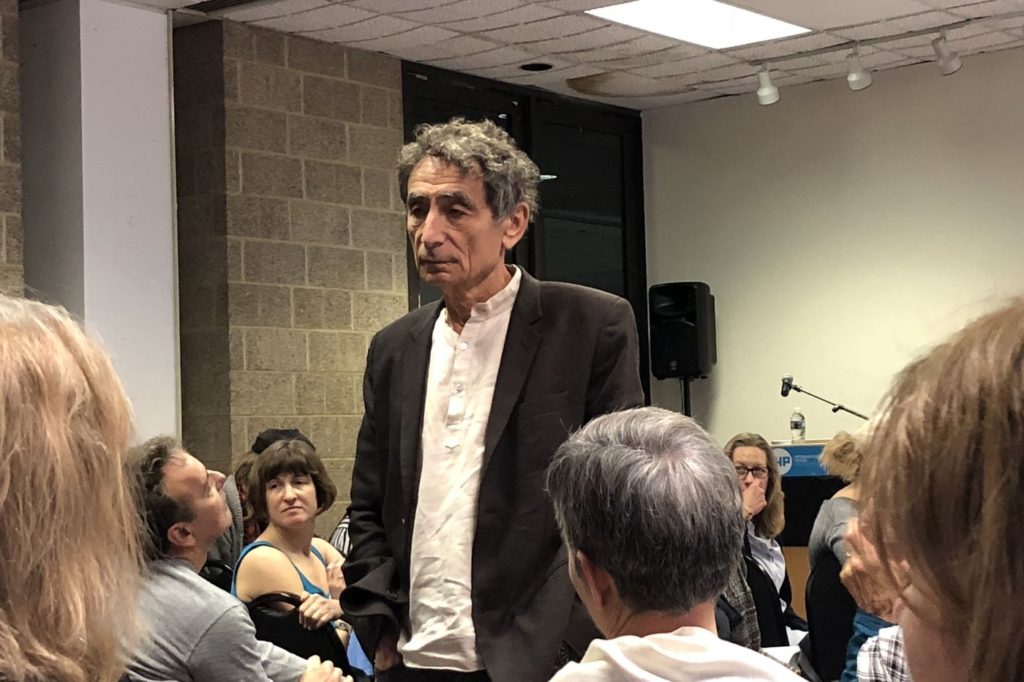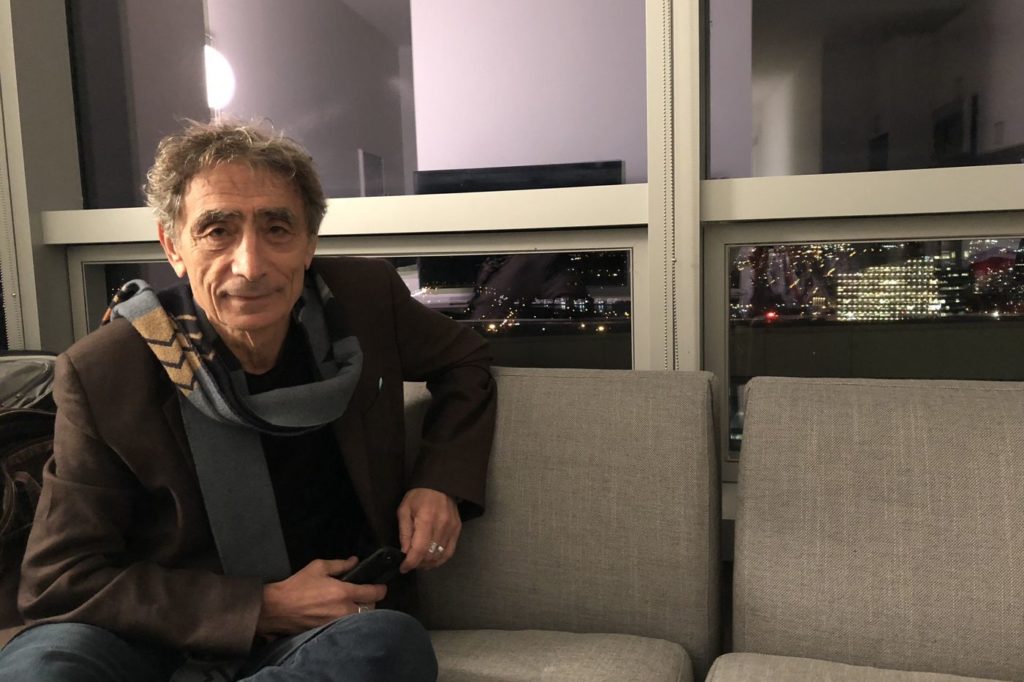How a Traumatized America Finds Relief in Hate
ANGLO AMERICA, 19 Nov 2018
Abraham Gutman – The Philadelphia Inquirer
The connecting line between addiction and hate, according to Dr. Gabor Maté, is trauma.
2 Nov 2018 – Robert Bowers allegedly killed 11 worshipers in a synagogue in Pittsburgh because he hates Jews. Dylann Roof killed nine worshipers in a church in South Carolina because he hates black people. Cesar Sayoc is believed to have sent more than a dozen pipe bombs by mail because he hates Democrats and CNN.
Hate seems to be everywhere we look — and it is violent. According to a Government Accountability Office report, in the 15 years after 9/11, right-wing domestic terrorists killed 106 people. The FBI recorded more than 6,000 hate crimes in 2016 — the last year for which data are available.
What drives so much hate and can it be stopped?
Dr. Gabor Maté‘s work can help us get toward an answer. Maté is a Hungarian-born Canadian physician and best-selling author who is best known for his work on addiction and attention deficit disorder. He thinks that just as some people find relief in drugs like heroin, some are finding relief and validation in harboring hate. Both are caused by an attempt to mask the pain of childhood trauma.
This week, Maté visited Philadelphia to give a keynote address in a symposium about addiction hosted by the Mural Arts Program. After the symposium, he sat for an interview with the Inquirer.
According to Maté, addiction is any behavior — not necessarily just drug use — that individuals cannot stop doing, despite harmful consequences, because it provides them with some relief or pleasure. He remembers a sex worker who told him that the first time she tried heroin, it felt like a “warm, soft hug.” For Maté, the question is not “Why the addiction?” but “Why the pain?”
The connecting line between addiction and hate, according to Maté, is trauma. “What happened in Pittsburgh is a manifestation of trauma,” Maté told the Inquirer. “There is no mass killer who wasn’t a traumatized person.”
Trauma is not foreign to Maté. He was born in Budapest to Jewish parents a month before the Nazi occupation of Hungary in 1944. His grandparents were killed in Auschwitz and his father was sent to forced labor. For his safety, his mother decided to give him to a Christian stranger. They were separated for a few weeks. Family members were eventually reunited and made their way to Canada. He became a physician, treating people in addiction on the eastside of downtown Vancouver, the drug-use capital of North America. During this time, he was a workaholic, depressed, and addicted to purchasing classical-music CDs, once spending as much as $8,000 on music in one week.
Just like addiction — to drugs or classic music — provides relief to people who were traumatized as children, so does hate.
People like the shooter from Pittsburgh have, according to Maté, “anger [that] has got nothing to do with what they think they are angry about. They are just angry because of what life has done to them as children and then they find external targets.” Politics plays a role, too. “It will give them a target and an explanation to their rage and an outlet to express their rage,” and “adds more and more fuel to direct their violence toward certain groups,” he says.

Canadian Hungarian-born physician and bestselling author Gabor Maté in Philadelphia for a symposium on addiction and trauma hosted by Mural Arts on October 29, 2018. Abraham Gutman / Staff
In his keynote address, Maté critiqued the view that prevention campaigns can solve addiction crises. “If those campaigns of ‘just say no’ [to drugs] were so successful, why are we having a 9/11 every three weeks?” — referring to the overdose death toll in the country.
Maté talks about hate in a similar fashion: “You can’t ‘just say no’ to hate.”
“You can’t fight hatred,” Maté explains. “Telling people not to hate is not fighting hatred.”
But there are solutions. The first step is recognizing the problem.
He says: “Instead of saying this is not our way, we should be saying, ‘Let’s get real — this [mass shooting] is happening. It is happening a lot. It is happening increasingly.’ ”
After recognizing that there is a problem, we need to find out what causes it. “We have to take an honest look at ourselves as a society and as a culture and say what is it about us that foments this kind of stuff,” he says.
Two major forces contribute to hate: racism and inequality.
“The research is absolutely clear,” Maté says. “The more inequality in a society, the more hate, the more dysfunction, the more mental illness, the more physical illness.” It should come as no surprise, then, that we see more addiction and more mass shootings since “the inequality is rising all the time.” Violence against racial, ethnic, or religious groups “is a manifestation of a society that foments division amongst people and sets people against each other.”
We can reduce the harm of hate by not letting it boil over. We can vote for legislators who will enact gun laws to reduce the harm in those moments that it does. And we can create an environment that allows parents to be there for their children emotionally to prevent trauma — that includes paid family leave and stopping the fetishization of hard work.
Both hate and addiction are a manifestation of a society that is ill, disconnected, and traumatized. It is an indictment of American culture and society that anyone finds relief by picking up a rifle and driving to a synagogue. To fight hate, we need to change our culture and society.
That’s a big task, but Maté believes it is possible: “It’s going to get worse before it gets better, but in the long term, I don’t have any doubts.”
DISCLAIMER: The statements, views and opinions expressed in pieces republished here are solely those of the authors and do not necessarily represent those of TMS. In accordance with title 17 U.S.C. section 107, this material is distributed without profit to those who have expressed a prior interest in receiving the included information for research and educational purposes. TMS has no affiliation whatsoever with the originator of this article nor is TMS endorsed or sponsored by the originator. “GO TO ORIGINAL” links are provided as a convenience to our readers and allow for verification of authenticity. However, as originating pages are often updated by their originating host sites, the versions posted may not match the versions our readers view when clicking the “GO TO ORIGINAL” links. This site contains copyrighted material the use of which has not always been specifically authorized by the copyright owner. We are making such material available in our efforts to advance understanding of environmental, political, human rights, economic, democracy, scientific, and social justice issues, etc. We believe this constitutes a ‘fair use’ of any such copyrighted material as provided for in section 107 of the US Copyright Law. In accordance with Title 17 U.S.C. Section 107, the material on this site is distributed without profit to those who have expressed a prior interest in receiving the included information for research and educational purposes. For more information go to: http://www.law.cornell.edu/uscode/17/107.shtml. If you wish to use copyrighted material from this site for purposes of your own that go beyond ‘fair use’, you must obtain permission from the copyright owner.
